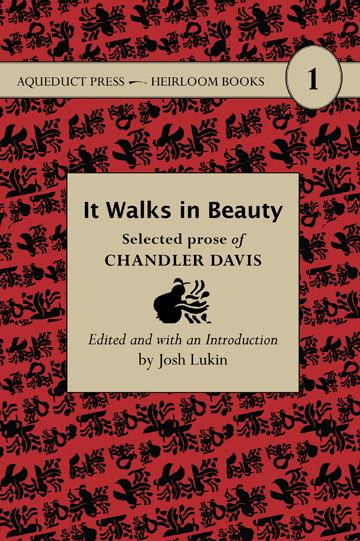It Walks in Beauty: Selected prose of Chandler Davisby Chandler Davis
edited and with an Introduction by Josh LukinHarvard awarded Chandler Davis a PhD in mathematics in 1950. Three years later, Davis was served with a subpoena as a result of his having paid for the printing of a pamphlet critical of the House Committee on Un-American Activities, and his subsequent ordeal included the loss of his job at the University of Michigan and a six-month imprisonment in 1960 for contempt of Congress. Blacklisted from full-time academic jobs in the US, he ultimately found employment in 1962 at the University of Toronto, where he is now an Emeritus Professor of Mathematics. It Walks in Beauty collects several of his science fiction stories, which probe deeply into such social and political issues as nuclear escalation, gender roles, and eugenics, as well as a selection of his essays, originally published in venues ranging from The New York Review of Books to the Waging Peace Series of the Nuclear Age Peace Foundation. The volume also includes a lengthy interview of Davis by Lukin; a speech Davis made at the February 1995 meeting of AAAS; and three essays by Lukin, taking a long view of Davis's work. In addition to his lifelong activism as a civil libertarian, Davis has been a director of Science for Peace and is a trustee of the Davis-Putter scholarship fund, founded by his father in 1961 to award grants to students working for peace and social justice. A poet and composer as well as a long-time co-editor of The Mathematical Intelligencer, Professor Davis combined his artistic and scientific interests in the anthology The Shape of Content: Creative Writing in Mathematics and Science (Chandler Davis, Marjorie Senechal, and Jan Zwicky, editors. Wellesley, MA: AK Peters, 2009). Advance Praise
Although Chandler Davis has published less than a score of science-fiction
short stories, some of us have long treasured them as brilliant gems. Josh
Lukin's thoughtful collection of Davis's fiction and nonfiction offers
21st-century readers a fine introduction to the work of this neglected and
invaluable writer.
This is a wonderful and unusual selection of science fiction and
political/psychological non-fiction, a collection of writing by Chandler
Davis. Informed by his personal life, his unwavering political activism
over the last half century, his professional life as a mathematician,
Davis' work provides invaluable insight and direction about what is to be
done—and always with wit, clarity, tolerance, and dissent. Whether
writing imaginatively or factually, he shows how narcissism so
destructively gets in the way of seeing others as real people and how it
works against acknowledging what is unknown. Chandler Davis relates to
past, present, and future times, always open to decipher the whole picture
and to speak up.
This is a terrific book. I can't remember the last time I have seen
fiction, especially science fiction, put so richly in context. It Walks in
Beauty introduces us to a remarkable man, gives us insight into the
American science fiction community of the 1940s and 50s, and reminds us
how much damage the McCarthy era of red hunts did to ordinary human lives
and to American civilization. Among the stories, I especially like "The
Names of Yanils," a thoughtful consideration of the relation of people to
tradition, and "It Walks in Beauty," an utterly creepy and true
description of sex roles in 50s America. I remember those sex roles, just
as I remember the red hunts.We have not recovered yet. Nor will we recover
until the ideas and integrity of people like Chandler Davis are
incorporated into our history and culture.
ReviewsThis scholarly volume, the first male-authored book from feminist SF press Aqueduct, explores the work of Chandler Davis, who refused to cooperate with 1950s McCarthyism and was dismissed from the University of Michigan faculty, academically blacklisted, and briefly imprisoned. As Lukin writes in his extensive introduction, Davis's writings "remind us that nothing and no one is as immutable as the dominant order would have us believe." Five stories—including "Last Year's Grave Undug" (1953), in which an "atombombed" America is still in the grips of "the Red scare" even though nations no longer exist, and the sublimely powerful "It Walks in Beauty" (1954), which examines a society where women with careers are rendered genderless–are accompanied by numerous essays, a speech, and a lengthy interview, all of significant interest to any fan of political SF. —Publishers Weekly, June 24, 2010
...For me, Davis's science-fiction stories and his discussions of the
Vanguard Amateur Press Association (VAPA) were a highlight of the
volume... Davis's friends and colleagues in VAPA and the
wider science-ficiton community of the mid-20th century
included Frederik Pohl, James Blish, Judith Merril, Virginia Kidd,
Theodore Sturgeon, aand Damon Knight—lunminaries whose names are
familiar to anyone who reads "Golden Age" science fiction. Less well
known might be the fact that they identified themselves as socialists,
leftists, communists, and Trotskyites, and the formed part of what
Davis calls "the New York Science Fiction Left Intellectual group"
(p. 297). His accounts of this group are fascinating and are one of my
favorite parts of the volume.
ISBN: 978-1-933500-37-9 (13 digit)
|

